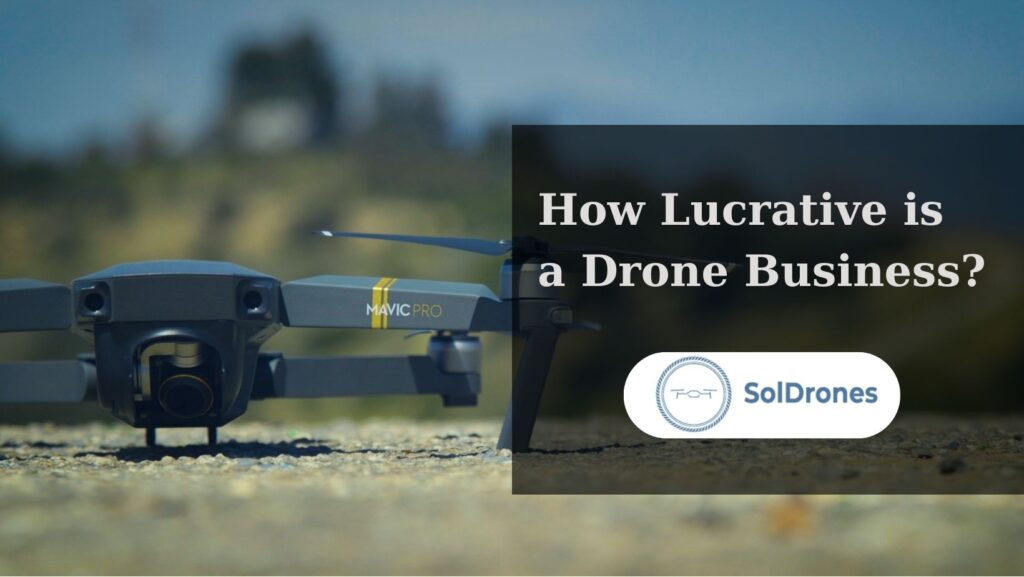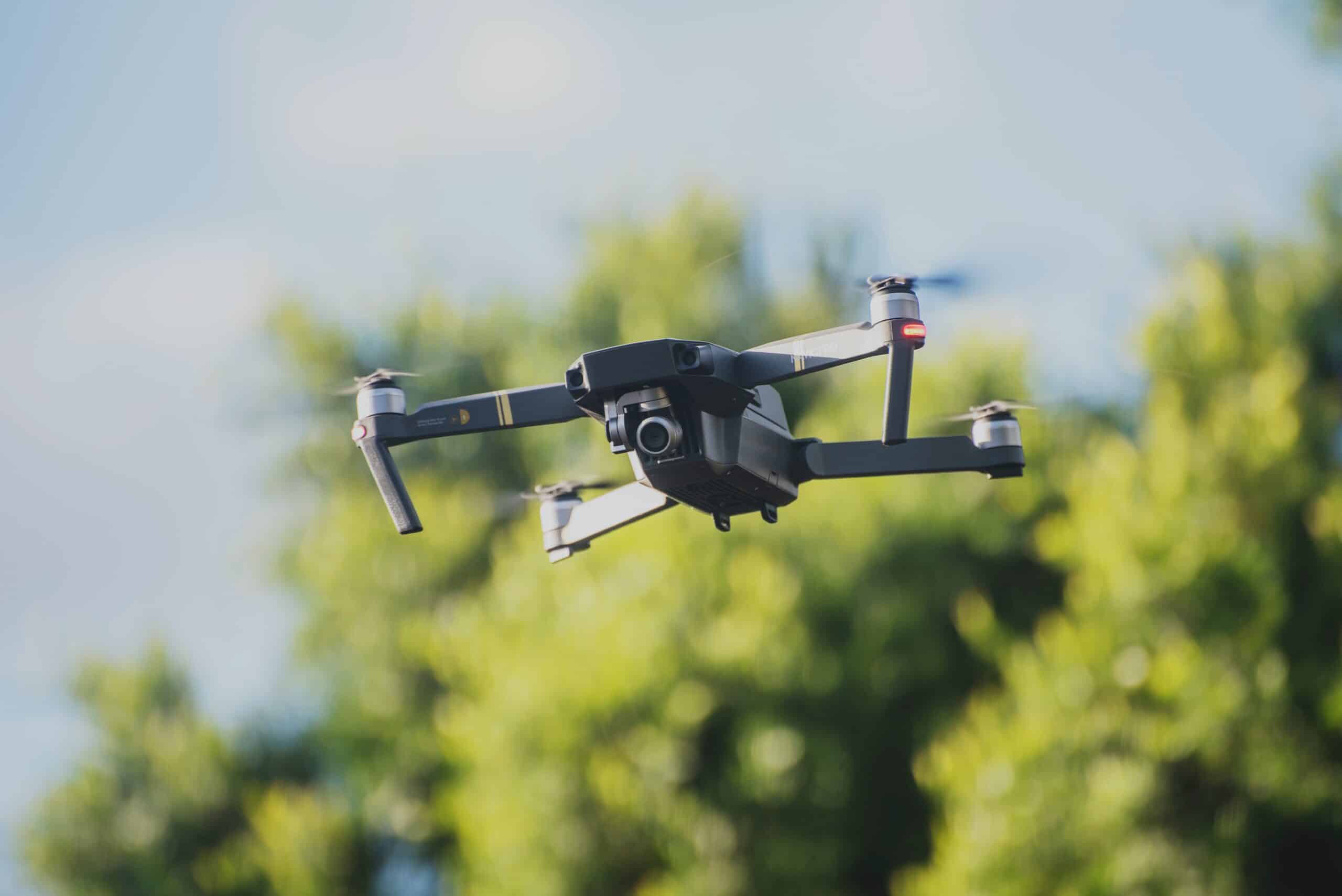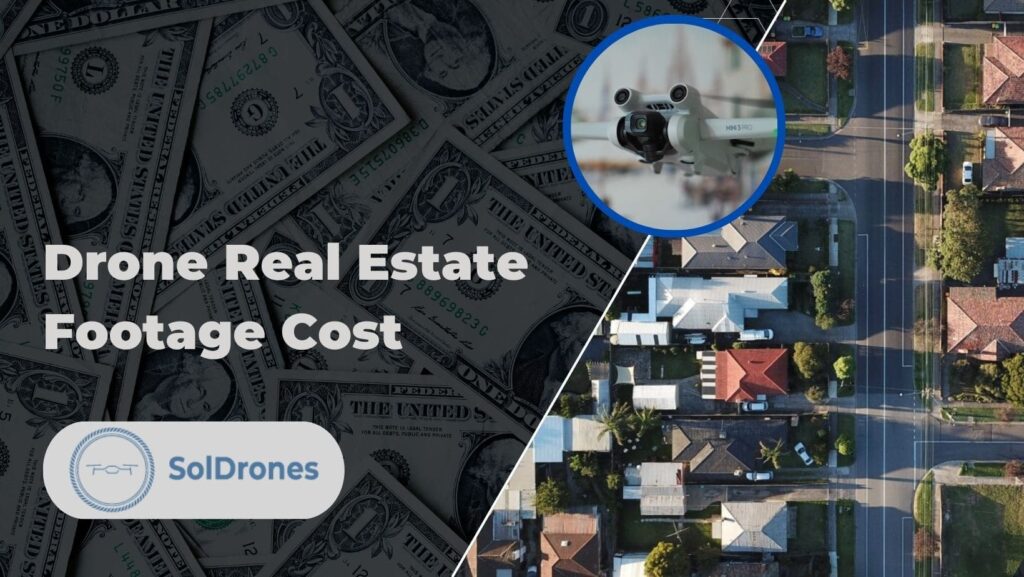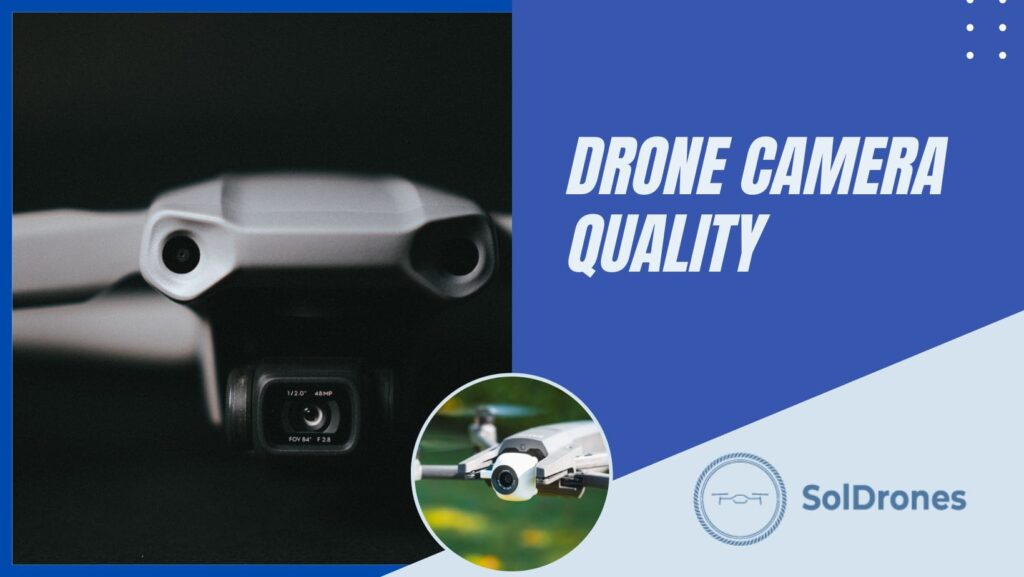If you’re wondering how lucrative a drone business is, you’ve come to the right place. At SolDrones, we invest our time and resources into studying the commercial drone industry to help drone pilots accelerate their careers while doing what they love – flying drones.
Making money with a drone isn’t exactly a get-rich-quick scheme. But, there are ways in which just about anyone can start earning money with their drone, fast.
“How lucrative a drone business is” depends on several factors such as market demand, marketing tactics, pricing model, service offerings, and more. Well-versed drone pilots that have mastered these skills are earning hundreds of dollars per hour. Some solo commercial drone pilots are earning well into six-figure salaries, and the best part is, they’re spending their time doing what they love and providing services for their customers that truly admire their work.
So read on to find out more about how lucrative drone businesses can be and if a career as a drone pilot is right for you.
Article Highlights
- Top earning factors include experience, industry, location, and more.
- Some pilots earn hundreds of dollars per hour for projects
- Top industries include event photography, real estate, and agriculture
- Starting a drone business is much easier than you think if you follow the right process
Key Factors to Earn More as a Drone Pilot
First and foremost, it’s important to understand that if you’re considering earning money as a drone pilot, you need to abide by the business and legal requirements enforced government entities such as the FAA in the United States. For instance, all commercial pilots need to register their drones with the FAA and obtain a Remote Pilot Certificate before conducting any drone activity for monetary value or indirect compensation. If you use your drone to take wedding photography in exchange for money, you would require a Remote Pilot Certificate. Interestingly enough, in some cases, even flying a drone as a volunteer requires a Remote Pilot Certificate.
Upon obtaining official registration as a pilot, you’ll have effectively established a means to generate income (legally) as a commercial drone pilot. At this point, it’s imperative that you distinguish yourself from the competition. As the commercial drone industry continues to experience exponential growth, a multitude of drone pilots are eagerly entering the market to offer their services to businesses in need of aerial surveying, inspections, photography, agricultural crop dusting, and other applications.
A few of the top factors that separate high-earning drone pilots from the rest include:
- Experience: As with many professions, experience is a key factor in determining a commercial drone pilot’s earning potential. Pilots with more flight hours and a wider range of experience are in higher demand and can charge clients higher service rates.
- Industry: The industry in which a commercial drone pilot works can have a significant impact on their earning potential. For example, pilots who specialize in real estate photography and videography are likely to earn more than those who primarily fly drones for industrial inspections.
- Type of Drone: The type of drone a commercial pilot operates is another key factor in their earning potential. Pilots who operate larger, more complex drones tend to earn more than those who fly smaller consumer drones.
- Location: Where you’re located matters as a commercial drone pilot. Larger cities and metropolitan areas come with higher demand for drone services and tend to earn more than those in rural areas.
- Reputation and Network: Often overlooked, the communities of which you’re a part play a critical role in being able to find clients and gain referrals as a drone pilot. Pilots with a strong reputation for quality work and a wide professional network are more likely to receive higher-paying job offers.
Top Industries to Earn Money as a Drone Pilot
One thing is for sure – drones are appearing almost everywhere and are rapidly becoming ubiquitous across many industries as businesses are discovering new ways to leverage drone technology to improve efficiency, safety, and cost-effectiveness. The versatility, functionality, and ease of use of drones have led to an explosion in their adoption across a range of industries, and their applications continue to expand as more and more technological advancements are made. As the drone industry continues to grow and evolve, the potential for new and innovative uses of drone technology seems limitless, making drones an essential tool for businesses across multiple sectors.
As a pilot seeking to earn an income from flying drones, it’s best to find a niche that aligns with your interests as well as location, skillset, and budget for equipment. A few of the top industries that are inspiring drone entrepreneurs include:
- Event Photography: Photography services for events, weddings, and companies that need marketing footage.
- Real Estate: Real estate agents are providing their clients with better marketing material by utilizing drone photography to showcase properties from an aerial view.
- Agriculture: Big ag companies leverage drones to monitor crops and livestock, and fertilize fields more efficiently than traditional farming methods.
- Construction: Ensuring worker safety on construction sites is absolutely critical to construction companies. An entire construction site can be surveyed and inspected in a matter of minutes with drone technology.
- Journalism: Aerial videos and photography and amplifying the journalism industry by providing journalists with new perspectives and methods of gathering information to tell their stories.
- Police & Fire: Serving as an alternative to helicopters, drone technology can be much more cost-effective when used by police forces or firefighters in need of aerial views, while providing more safety.
There are of course other industries that are growing in the demand for drone pilots, so don’t hesitate to research and explore your interest.
Ways to Make an Income as a Drone Pilot
As a commercial drone pilot – particularly one that specializes in drone photography, there are many ways in which you can earn an income, but ultimately, the methods are different methods of earning an income as a drone pilot, such as Client Based Projects or Residual/Passive Income.
Client Based Drone Projects
As a drone pilot, how you charge your clients is just as important as the quality of your services. Understanding the different pricing models available to you can help ensure that you are getting a fair rate for your work, while also meeting the needs of your clients. Some common pricing models for drone pilots include:
- Hourly Rate: Drone pilots charge a set hourly fee for their services, which may include flight time, equipment use, and post-processing. This model is a popular choice for projects with a defined timeline and scope, such as real estate photography or event coverage.
- Project-based Rate – Drone pilots negotiate a fixed fee for a specific project. This model takes into account the complexity of the project, the level of expertise required, and any other factors that may impact the cost. Project-based rates are ideal for complex projects with multiple components, such as construction inspections or environmental surveys.
- Package Rate: Drone pilots charge a set fee for a pre-determined package of services, such as a set number of flight hours, aerial photos, and video footage. This model is best suited for projects with a well-defined scope and can offer clients a convenient and cost-effective solution.
- Usage Fee: Drone pilots charge a fee based on the intended usage of the aerial footage, such as licensing for commercial purposes or personal use. This model is particularly relevant for drone pilots who specialize in creating aerial footage for the film and television industry.
Ultimately, every project is unique and the pricing model you choose should be tailored to meet the needs of both you and the client. By carefully considering the different options available, drone pilots can ensure that they are getting a fair and equitable rate for their work.
Residual/Passive Income
Beyond providing hourly services for clients, there are several overlooked ways in which drone pilots can earn nearly passive income. If you take amazing photography and videography with your drone, you can leverage that content on social media, YouTube, and even through licensing partnerships. We explain further in the section below:
- Social Media Pages (Instagram, Facebook, TikTok): Create social media pages across Instagram, Facebook, TikTok, and other social media channels. By posting valuable content that drives social media engagement and attracts more followers, you can unlock monetization opportunities on your Instagram page. Several ways in which you can monetize your social media accounts include forming partnerships with brands and promoting their sponsored content, enabling ads on your Reels or videos, or joining affiliate programs.
- YouTube Channel: Create a YouTube channel that showcases the footage you’ve captured. By editing your drone video content and adding voiceovers, captions, and music, you can turn a quick and simple video into a stellar production.
- Licensed Footage (Unsplash, Shutterstock, Pexel): Websites like Flickr, Pexel, Unsplash, and Getty Image give photographers and videographers unique opportunities to expand their audience reach and potentially earn passive income from the content they create. For example, if you create a Flickr account, you can license your content through Getty Images, and when your content is used, you will earn a small commission. In some cases, sites like Pexels may not pay you directly, however, your photography could be used by marketers that attribute your credit.
There are of course opportunities for drone pilots to work directly with organizations in which they’re hired full-time. An example of this would be a drone pilot that’s hired by a movie production agency and is one of the chief drone operators. These types of UAV pilots are placed on annual salaries and according to ZipRecruiter, UAV drone pilots can earn on average of $64,000+ per year in the United States.
How Lucrative is a Drone Business
As of February 2023, according to ZipRecruiter, UAV drone pilots can earn on average $64,000+ per year in the United States. ZipRecruiter also states that some drone pilots are earning well into the six figures. Where you’re located will highly dictate your earning potential as a commercial drone pilot. For example, if you’re providing drone pilot services in rural areas with low demand and competition, you’re likely going to have a lower earning potential than in large metropolitan cities like Los Angeles, San Francisco, New York, or Miami.
Looking at another source, Salary.com, UAV pilots are earning on average $82,976 per year as of January 2023. As you can see, results will vary depending on which pay scale site you reference. You might also be able to assume that experienced drone pilots have higher earning potential, which is advantageous for you if you’re in the drone business for the long haul. The more time you put into your career as a drone operator, the more you will be rewarded monetarily and will make more money with a drone. Ultimately, your success as a drone pilot is entirely up to you
Is the Drone Business Right For You?
As much as drone pilots are wanting to fly drones and capture stunning photography and videography, businesses are needing drones for photography, photogrammetry, inspections, and many other use cases.
Weddings, sports events, and movie production agencies are willing to pay a premium for the right drone photographer. Simply put, while there are more and more commercial drone photographers entering the industry, their services are becoming in high demand.
Another primary reason why you should consider starting a commercial drone business is because of the advancements in technology. It’s only going to get easier for businesses to invest in and utilize drones for their operations. From improved cameras and sensors to advanced software and automation, the capabilities of drones are expanding and becoming more accessible to small and medium-sized businesses. On top of that, drones are becoming much more cost-effective and easier to use for non-technical operators.
Before embarking on a career as a commercial drone pilot, spend some time reflecting on the job and lifestyle itself to determine if it’s right for you. Ask yourself questions like:
- Do you enjoy operating technology and are you comfortable learning new skills?
- Are you comfortable working alone for extended periods of time?
- Do you have an eye for detail and a passion for aerial photography or videography?
- Are you willing to invest in training, equipment, and certifications to ensure that you are a qualified and competitive candidate?
Answering these questions honestly can help you gain clarity on whether a career as a commercial drone pilot is right for you. If you have a strong interest in aerial technology and are willing to invest time, effort, and resources into honing your skills, a career as a commercial drone pilot may be a fulfilling and rewarding path to pursue.
Ultimately, if you’re an entrepreneurial-minded individual that enjoys being outdoors and capturing photography of nature or urban environments, or simply flying UAV aircraft, starting a commercial drone business is a wise investment as the industry is projected to grow significantly, presenting new and diverse opportunities to service clients.
Getting Started as a Commercial Drone Pilot
Once you’ve committed to starting your commercial drone business, it’s advantageous to develop a sound business plan. The following 6 steps are commonly used by commercial drone pilots:
- Research
- Legal Requirements
- Niche
- Business Setup
- Marketing
- Scaling Your Commercial Drone Business
The sections below explain in detail each step.
1. Commercial Drone Industry Research
When you’re just starting off as a commercial drone business, you’ll want to conduct ample research so you know exactly what you’re getting yourself into. As the old saying goes: measure twice, cut once.
Here are a few key tenets to keep in mind to guide your research framework:
- Legalities & FAA Regulations: Familiarize yourself with the Federal Aviation Administration (FAA) guidelines and regulations for commercial drone operation. For example, to earn an income as a commercial drone pilot, you must obtain a Remote Pilot Certificate by passing the Part 107 exam, as well as register your drone with the FAA.
- Market and Competition: Analyze the current landscape of drone service providers and identify potential areas for growth and differentiation. By developing a better understanding of your potential customers and the market competition, you’ll be able to properly set up your business for success with marketing and sales.
- Technology and Equipment: Research the technology and equipment that’s best for the type of business you wish to operate. Look into drone cameras, sensors, and video editing software. Determine which of these will best suit your business needs and budget.
- Financing: Research the different financing options available to you, such as bank loans, crowdfunding, venture capital, or bootstrapping your business with your funds.
2. Legal Requirements
As mentioned, the FAA has regulations for all pilots seeking to fly drones in the United States. If you’re abroad, there are other country-specific regulations you need to also be aware of. It’s in your best interest to work with the FAA’s guidelines, rather than against them. Failure to comply can result in hefty fines and restrictions.
A few legal requirements to keep in mind include:
- Certifications: Make sure you’ve passed the Part 107 exam and are certified as a remote pilot.
- Registering Your Drone: Register your drone with the FAA.
- Flying in Legal Airspace: Only fly in legal airspace. The best resource in the U.S. to determine authorized airspace is the B4UFLY app, which is an FAA-partnered app that allows drone pilots to access an interactive map that identifies airspace classes.
3. Niche Selection
Do you want to be a drone pilot that photographs for real estate agents and weddings, or do you want to fly agricultural drones that pesticide plants? When it comes to selecting a commercial drone business niche, it’s critical to consider how you’re going to stand out from the competition while maintaining a steady customer flow.
Some factors to consider when selecting your drone business niche include:
- Equipment Required: Will your niche require a heavy-duty drone like the DJI Phantom 4 Pro, or something more simple, like a DJI Mini 3 Pro? Typically, the more sophisticated the drone, the higher the earning potential.
- Environment: Do you want to be spending time in nature flying a drone through farmlands or national parks, or do you prefer inspecting buildings? Or, in the case of real estate drone photography, taking photos and videos in and around houses and properties.
- Content Production: Drone footage and images can require editing and post-production that can often deter pilots and photographers. It’s important to understand your willingness to edit and the content you capture through video editing software before making an extensive commitment to your niche.
- Services: Photography and photogrammetry and the primary services offered by most commercial drone pilots. There are other services such as agricultural monitoring or search and rescue support during natural disasters.
4. Business Setup
Determine what business setup and structure most benefits your entrepreneurial goals. Your drone business can operate as a sole proprietorship, partnership, limited liability company (LLC), C corporation, or S corporation.
Freelance drone pilots often fly under a sole proprietorship or LLC structure. Sometimes it makes sense to set up your drone business as a partnership, C corporation, S corporation, or other types of corporation. Each structure has its own advantages and disadvantages, so be sure to choose one that aligns with your goals and potential liabilities.
It’s also necessary to obtain insurance coverage to protect your business and assets. In fact, the FAA requires drone operators to have liability insurance.
Finally, it’s always recommended to have a record-keeping system. This will help you manage your finances and ensure you’re compliant with tax laws.
5. Marketing
One of the most difficult aspects of all businesses is finding new customers. Ultimately, finding new customers is the only way you’re going to generate income and improve your profit margins. In some cases, you may be able to rely on relationships you’ve established throughout the years to generate new customers. But more often than not, you will need to deploy marketing and sales tactics that generate brand awareness and new leads.
Some of our top suggestions for marketing your drone business include:
- Digital Properties: Create a website for your business, along with social media pages on Facebook, Instagram, and LinkedIn.
- Networking: Attend industry events and meetups that attract your ideal buyer personas.
- Portfolio: Create a portfolio to showcase your work. In many cases, you can use an Instagram channel as a digital portfolio.
- Partnerships: Form partnerships with associates throughout the industry and exchange value with each other.
- Sales Outreach: Research companies that could utilize your drone services and reach out via email and phone, offering your services with unique value propositions.
- Scaling Your Commercial Drone Business
Mastering the fundamentals of being a commercial drone entrepreneur will take time, but in the long run, is totally worth it. Once your business is up and running, you’ll want to double down and scale so you can watch your profits grow. Building a business that is highly discoverable for your ideal buyer personas and brings them value is the key to success. Leverage your network, marketing, and skills to get in front of the right customers and you’ll be destined for success.
Final Thoughts
As you can see, answering the ultimate question, “how lucrative is a drone business?”, is a rather complex question that’s entirely dependent upon where you live, the services you’re providing, your experience, and much more. But, with the proper level of commitment, you can certainly succeed and become a top earner. Whether you’re starting your own drone business or looking for drone pilot jobs, acquiring more skills and experience will only serve you for the better. Plus, your ability to market your drone business effectively will undoubtedly elevate your earning potential. Good luck, and see you in the skies!







